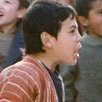 Phil Bray/Paramount Vantage
Phil Bray/Paramount VantageThe Bigger Picture: Amir is a lonely boy growing up in 1970s Afghanistan in this adaptation of Khaled Hosseini's breakout novel. His father is a wealthy, Westernized man (Homayoun Ershadi, just magnificent) who overshadows the boy in every way. Amir's only friend is Hassan, who's also a servant in his house. Hassan idolizes Amir, even though Amir proves he's not worth it after Hassan is attacked savagely by a trio of older boys.
Amir and his father flee to America when the Soviets invade. Twenty years later, Amir gets a call telling him that Hassan's son, now an orphan, needs his help.
Structurally, the movie plods through the years as if the filmmakers were afraid to cut back and forth between past and present. After a brief intro, we go back two decades and then slog forward in what feels like real time, with most of the dialogue in subtitles.
But the power of the film's key scenes can make you forget the long, long, long trip it takes to get to them. Amir is not a brave man—he is often weak and cowardly—but when he's quaking with fear, he finds the courage to risk everything and do what's right. That one act may not be enough to redeem him, let alone all the pain and suffering that's gone on before. But it's literally all he can do, so it has to be enough.
The 180—a Second Opinion: Some cynics might argue the obscene irony of spending $20 million on a film about the plight of Afghani children in what's obviously a quest for Oscars and Globes and other little gold statues, when that same amount could feed and clothe an awful lot of Afghani children. Not us, of course, but some people.